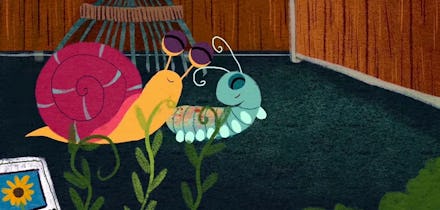A Snail and a Caterpillar Perfectly Explain How To Deal With Our Own Privileges

Asking people to "check their privilege" can be an awkward part of discussions of social issues, but it's often a necessary one; conversations about things like racism, sexism and homophobia get tense when people with differing identities have trouble understanding — and, as such, empathizing with — another's struggles.
This lack of awareness of others' experiences is a manifestation of privilege, and while the request to check it might be hard to swallow, it shouldn't be. Luckily, a new video starring a snail and a caterpillar by YouTube star Franchesca Ramsey and animator Kat Blaque is making "privilege" — which is really just about knowledge and respect — easier than ever to grasp.
How privilege works: In the video, the snail and the caterpillar leave their garden to attend a party. On the way, they reach a gate. The caterpillar can easily slide under, but the snail's shell is too big to fit. When the snail asks for help, the caterpillar dismissively replies, "Dude, just go under ... come on, we're going to be late and I'm trying to hook up with that super cute ladybug."
But the snail's shell just won't fit, because it "just can't crawl under the fence like you can." The caterpillar then gets defensive at the implication that its life is easier just because he doesn't have a bulky shell.
But the snail asserts that everyone's struggles are different, and the fact is, the caterpillar doesn't have to think about traveling with a shell because it doesn't have one.
This difference in experience is at the core of privilege, and emphasizes why it's an important concept to remember in conversations about hot button topics.
"The thing is, you just don't know what you don't know," Ramsey told Mic. "There are always going to be things that you've never experienced, so oftentimes you're not able to see someone else's perspective until you've been exposed to those people or learned about their challenges."
"Sometimes you're the snail and sometimes you're the caterpillar," Ramsey narrates in the video.
Building coalitions is important: Eventually the caterpillar works with the snail to find another way to the party — one that works for both of them. This is also reflective of an important component in discussions of identity and privilege.
"I think the more people who are willing to work together and fight for equality, the better. Simply put, people with differing privileges have access to spaces, resources and people that others don't," Ramsey said. "That access can be incredibly valuable when it comes to creating positive change and also reaching people who need to learn and grow."
Listening and self-education matters: As demonstrated in the video, the snail and the caterpillar work out their problem with a conversation full of active listening, empathy and education.
"Listening is the most important first step," Ramsey told Mic. "The best way to learn about the experiences of people that are different from you is to listen to them so you can learn what their challenges are and the best way to support them."
Indeed, taking the time to be conscientious could make all the difference in creating a more welcoming and inclusive environment for everyone. In order to foster social equity, it's necessary to cultivate an enriched understanding of how various differences in identities and experiences create ranges of privilege and limitation. That way, everyone's invited to the party.